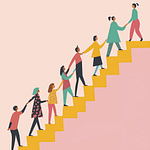We didn’t talk about work/life balance in the early days of Instrument. Not once. It wasn’t that we didn’t believe in it—we just didn’t have the luxury. We were building something out of nothing, running on instinct, adrenaline, and a blind belief that if we gave everything we had, something remarkable would emerge.
For four or five years, the only balance we knew was the kind that kept us from collapsing under our own ambition. There were no vacations. No office yoga. No Slack messages reminding you to log off early. There was just work—and the conviction that it mattered.
And in many ways, it did. That kind of all-in, lights-on, no-plan-B energy is rare. It’s also necessary, at least for a time. It builds things. It reveals who wants it most. It forges bonds and sets standards. But it also takes a toll—on your body, your mind, your relationships, your sense of self. It slowly erodes the parts of you that aren’t directly contributing to the mission. And over time, you start to disappear into the very thing you’re building.
Eventually, I woke up to that. We all did. Not because we were exhausted—although some of us were. But because we wanted to be better. Better leaders. Better teammates. Better thinkers. Better humans. And we realized we couldn’t be better if we didn’t have full lives.
Balance wasn’t about easing up. It was about raising the standard.
I’m an energetic guy. I always have been. I like to go hard. I like to work at the edge of what’s possible. But I also learned that if I wanted my team to match that intensity, I had to make sure they had enough life outside of work to recover. To refuel. To come back ready.
So we started talking about something radical: going home at five.
Not as a favor. Not as a lifestyle perk. But as part of the system. Go home. Live a life. Come back the next day full of energy, new ideas, a clearer head, and a deeper well. Show up at nine. Go full send. Eat lunch. Full send again. Then—hockey stop. Go live. Do something that fills you up. Then bring all of that back to the work.
It was never about dialing down. It was about turning up, sustainably.
And here’s the truth I’ve come to believe: the people who can do that—who can live with discipline and passion both in and out of work—those people are different. They’re electric. They’re dangerous in the best way. They’re often the ones with the sharpest ideas and the richest lives. They bring the heat and the perspective. The hustle and the stillness. They’re the ones who can sit in a client meeting and blow your mind, then leave to pick their kid up from school or train for an Ironman or go see a band you’ve never heard of in a tiny venue that smells like spilled beer and magic.
I like those people. I’ve built my career around those people. I’ve tried to be one myself.
Because balance isn’t about doing less. It’s about doing more—with purpose.
It’s about being the kind of person who doesn’t just exist in one lane, but who thrives across the full spectrum of life. Who can hold complexity. Who doesn’t burn out because they know how to rest, how to recover, how to play, how to love.
That’s what makes you great—not just at work, but at everything.
And if we’re being honest, isn’t that the whole point? To be great at work, and great at being a partner. To be a killer strategist and someone who remembers birthdays. To win the pitch and tuck your kids in at night. To chase your ambitions so hard it makes people nervous, and still have enough soul left to laugh at yourself over dinner with old friends.
That’s not weakness. That’s mastery.
And yeah, some days will be lopsided. Some seasons will demand more from one side of the scale than the other. That’s okay. This isn’t about balance in the hour-to-hour. It’s about balance in the arc. The long game. The question you’ll ask yourself in ten years: Did I give myself a real chance at greatness—in all of it?
Because one day, the work will slow down. The projects will end. The titles will fade. And you’ll be left with the person you’ve become while building it all.
And what I hope—what I really hope—is that you won’t be a hollowed-out version of yourself. I hope you’ll be strong. Grounded. Whole. I hope you’ll be able to say: I gave it my all, and I never lost myself along the way.
So yeah, go full send. Work like it matters—because it does. But also: pull back. Breathe. Make room. Chase joy. Get sunlight. Take your partner to lunch. Learn to play the damn guitar. Be passionate about your craft, and equally passionate about your life. Keep a bird’s-eye view on it all. Zoom out. Adjust. Stay awake to what’s being traded, what’s being gained, what’s being lost.
Because the goal is not just to be great at work.
The goal is to be great at life.
And the only way I know how to do that—day after day, year after year—is balance.
If this episode helped you reflect on how you’re showing up—in work, in life, in the spaces between—send it to someone you respect, someone who’s chasing hard things and trying to stay whole while doing it.
I publish every weekday morning on Substack, Apple, and Spotify. Subscribe to stay in the loop. And if you’re enjoying the ride, a quick review or share goes a long way.
Until next time—go full send. Then take a breath. Because the best kind of greatness is the kind you can carry for the long haul.
Balance is the edge. Live on it.











Share this post